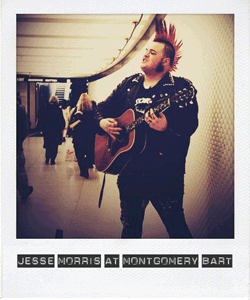Sweet subway sounds: "Punk rock Johnny Cash" among BART buskers who entertain riders
By Melissa Jordan
BART/Senior web producer
As commuters streamed off a rush-hour train one recent Wednesday afternoon, a few stopped to stare at the man with the deep booming voice, strumming a guitar and singing in the 24th St. Mission BART Station.
"I hear the train a'coming. It's rolling by the bend. And I ain't seen the sunshine since I don't know when. I'm stuck in Folsom Prison..."
A woman lingered, turned to another bystander and said, "He sounds JUST like Johnny Cash!"
Jesse Morris, known to many BART riders as "the punk rock Johnny Cash," does sound uncannily like the country music icon, but he likes to mix it up sometimes with a little punk from the Ramones and the Clash. He has played in stations for years and is perhaps one of the best known BART buskers, part of a tradition of musicians playing in public places for tips, or just for the fun of it.
Music in BART stations runs the gamut, from Peruvian flutes to barbershop quartets, Mariachi to blues. Every week riders remark on how a performer brightened their day ("the folk singer at Montgomery BART has the voice of an angel!") and occasionally weigh in to pan the ones they dislike. ("The saxophone player who only plays one song, 'Somewhere over the Rainbow', is driving me crazy!")
 |
|
Photo by fiveinchpixie
|
PART OF THE TRANSIT TABLEAUX
Mostly, musicians seem to be welcomed as a part of the transit tableaux, although they are allowed only in the non-paid areas of the BART stations (outside the faregates). They are supposed to obtain an expressive activities permit (available for free, details here) and are generally not a problem if they are following the rules, which include not using amplifiers, not obstructing the flow of pedestrian traffic in any way and following any instructions from station agents or other personnel.
The most important rule among performers, says Jesse Morris, is not to set up too close to each other. He had taken up a spot at 24th St. Mission vacated earlier by a duo belting the Beatles. Passersby stopped to throw pocket change, and a couple of bills, into the guitar case lying open on the ground in front of him.
Why does he like playing in BART stations?
"The acoustics are good down here, the people are friendly," he says. "They stop and listen, they tip, they smile ... I have a good time down here."
Although Morris has a night job at a bar, and writes and plays original material with his band, Jesse and the Man Cougars, he keeps coming back to play at BART.
"I consider it a job," he says. "Just like some people might work in an office, I work at the station entertaining people. I get to do what I love, and I can make a living at it."
Morris started busking outside a 7-11 in the Oakland hills when he was around 13 -- playing Beck, Green Day, mostly rock 'n' roll. A few years later he was turned on to country music by some friends and stumbled on to the autobiography of Johnny Cash.
FALLING IN LOVE WITH JOHNNY
"I kind of fell in love with him,," he says. "And then realized, 'Oh, I sound kind of like this dude.' " The more he sang Cash's songs, the more he perfected the sound. He doesn't dress like the Man in Black -- a knit cap, nose ring and punk-patched jacket are more his style, and he once had a mohawk -- but he is happy to be known as "the Johnny Cash guy." "Kind of like an Elvis impersonator, but not as cheesy," he says.
He embraces the Cash rebel ethos as well; his upper arm is tattooed with the famous image of Cash making a rude gesture toward a photographer during a 1969 concert at San Quentin Prison. Cash later used the photograph to rebuke the country music industry, taking out a full-page ad in Billboard in the 1990s after he had won a Grammy to saracastically thank the establishment and country radio for their "support."
Morris draws influences from old-school country, the plaintive stories of cheating, drinking and heartbreak from singers like Hank Williams and Merle Haggard. Singing at 24th St. Mission, he shifted his voice to a higher register, added a little twang, and channeled Haggard with "Mama Tried."
"I turned 21 in prison doin' life without parole; No one could steer me right but Mama tried, Mama tried... Mama tried to raise me better, but her pleading I denied, that leaves only me to blame 'cause Mama tried."
Hard-core country might seem an odd fit for the hipsters, grifters and other denizens of the Mission BART but the crowd was approving, dropping dollars in the guitar case, clapping and tapping along in rhythm. Perhaps the lyrics of "Busted," the Harlan Howard song Cash recorded with the Carter family, resonate in these times of recession and foreclosure, even in an urban milieu?
"I got a cow that's gone dry, and a hen that won't lay; a big stack of bills that gets bigger each day; The county's gonna haul my belongings away, I'm busted."
FROM BART TO ANNIE'S SOCIAL CLUB
Morris says even after a late night when he doesn't really feel like going down into the station, "I get down here and see I made somebody smile. It means something ... to see somebody stoked on somethat that you're doing; it's amazing."
You can hear clips of Morris and his band, the Man Cougars, on their MySpace page at www.myspace.com/mancougars, or catch their concert at Annie's Social Club on Oct. 28.
Want to share your favorite story about a BART musician? Email us at [email protected].